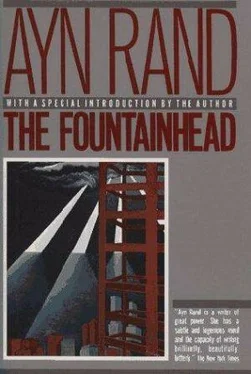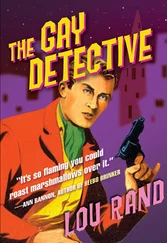"A man thinks and works alone. A man cannot rob, exploit or rule — alone. Robbery, exploitation and ruling presuppose victims. They imply dependence. They are the province of the second-hander.
"Rulers of men are not egotists. They create nothing. They exist entirely through the persons of others. Their goal is in their subjects, in the activity of enslaving. They are as dependent as the beggar, the social worker and the bandit. The form of dependence does not matter.
"But men were taught to regard second-handers — tyrants, emperors, dictators — as exponents of egotism. By this fraud they were made to destroy the ego, themselves and others. The purpose of the fraud was to destroy the creators. Or to harness them. Which is a synonym.
"From the beginning of history, the two antagonists have stood face to face: the creator and the second-hander. When the first creator invented the wheel, the first second-hander responded. He invented altruism.
"The creator — denied, opposed, persecuted, exploited — went on, moved forward and carried all humanity along on his energy. The second-hander contributed nothing to the process except the impediments. The contest has another name: the individual against the collective.
"The 'common good' of a collective — a race, a class, a state — was the claim and justification of every tyranny ever established over men. Every major horror of history was committed in the name of an altruistic motive. Has any act of selfishness ever equaled the carnage perpetrated by disciples of altruism? Does the fault lie in men's hypocrisy or in the nature of the principle? The most dreadful butchers were the most sincere. They believed in the perfect society reached through the guillotine and the firing squad. Nobody questioned their right to murder since they were murdering for an altruistic purpose. It was accepted that man must be sacrificed for other men. Actors change, but the course of the tragedy remains the same. A humanitarian who starts with declarations of love for mankind and ends with a sea of blood. It goes on and will go on so long as men believe that an action is good if it is unselfish. That permits the altruist to act and forces his victims to bear it. The leaders of collectivist movements ask nothing for themselves. But observe the results.
"The only good which men can do to one another and the only statement of their proper relationship is — Hands off!
"Now observe the results of a society built on the principle of individualism. This, our country. The noblest country in the history of men. The country of greatest achievement, greatest prosperity, greatest freedom. This country was not based on selfless service, sacrifice, renunciation or any precept of altruism. It was based on a man's right to the pursuit of happiness. His own happiness. Not anyone else's. A private, personal, selfish motive. Look at the results. Look into your own conscience.
"It is an ancient conflict. Men have come close to the truth, but it was destroyed each time and one civilization fell after another. Civilization is the progress toward a society of privacy. The savage's whole existence is public, ruled by the laws of his tribe. Civilization is the process of setting man free from men.
"Now, in our age, collectivism, the rule of the second-hander and second-rater, the ancient monster, has broken loose and is running amuck. It has brought men to a level of intellectual indecency never equaled on earth. It has reached a scale of horror without precedent. It has poisoned every mind. It has swallowed most of Europe. It is engulfing our country.
"I am an architect. I know what is to come by the principle on which it is built. We are approaching a world in which I cannot permit myself to live.
"Now you know why I dynamited Cortlandt.
"I designed Cortlandt. I gave it to you. I destroyed it.
"I destroyed it because I did not choose to let it exist. It was a double monster. In form and in implication. I had to blast both. The form was mutilated by two second-handers who assumed the right to improve upon that which they had not made and could not equal. They were permitted to do it by the general implication that the altruistic purpose of the building superseded all rights and that I had no claim to stand against it.
"I agreed to design Cortlandt for the purpose of seeing it erected as I designed it and for no other reason. That was the price I set for my work. I was not paid.
"I do not blame Peter Keating. He was helpless. He had a contract with his employers. It was ignored. He had a promise that the structure he offered would be built as designed. The promise was broken. The love of a man for the integrity of his work and his right to preserve it are now considered a vague intangible and an unessential. You have heard the prosecutor say that. Why was the building disfigured? For no reason. Such acts never have any reason, unless it's the vanity of some second-handers who feel they have a right to anyone's property, spiritual or material. Who permitted them to do it? No particular man among the dozens in authority. No one cared to permit it or to stop it. No one was responsible. No one can be held to account. Such is the nature of all collective action.
"I did not receive the payment I asked. But the owners of Cortlandt got what they needed from me. They wanted a scheme devised to build a structure as cheaply as possible. They found no one else who could do it to their satisfaction. I could and did. They took the benefit of my work and made me contribute it as a gift. But I am not an altruist. I do not contribute gifts of this nature.
"It is said that I have destroyed the home of the destitute. It is forgotten that but for me the destitute could not have had this particular home. Those who were concerned with the poor had to come to me, who have never been concerned, in order to help the poor. It is believed that the poverty of the future tenants gave them a right to my work. That their need constituted a claim on my life. That it was my duty to contribute anything demanded of me. This is the second-hander's credo now swallowing the world.
"I came here to say that I do not recognize anyone's right to one minute of my life. Nor to any part of my energy. Nor to any achievement of mine. No matter who makes the claim, how large their number or how great their need.
"I wished to come here and say that I am a man who does not exist for others.
"It had to be said. The world is perishing from an orgy of self-sacrificing.
"I wished to come here and say that the integrity of a man's creative work is of greater importance than any charitable endeavor. Those of you who do not understand this are the men who're destroying the world.
"I wished to come here and state my terms. I do not care to exist on any others.
"I recognize no obligations toward men except one: to respect their freedom and to take no part in a slave society. To my country, I wish to give the ten years which I will spend in jail if my country exists no longer. I will spend them in memory and in gratitude for what my country has been. It will be my act of loyalty, my refusal to live or work in what has taken its place.
"My act of loyalty to every creator who ever lived and was made to suffer by the force responsible for the Cortlandt I dynamited. To every tortured hour of loneliness, denial, frustration, abuse he was made to spend — and to the battles he won. To every creator whose name is known — and to every creator who lived, struggled and perished unrecognized before he could achieve. To every creator who was destroyed in body or in spirit. To Henry Cameron. To Steven Mallory. To a man who doesn't want to be named, but who is sitting in this courtroom and knows that I am speaking of him."
Roark stood, his legs apart, his arms straight at his sides, his head lifted — as he stood in an unfinished building. Later, when he was seated again at the defense table, many men in the room felt as if they still saw him standing; one moment's picture that would not be replaced.
Читать дальше










